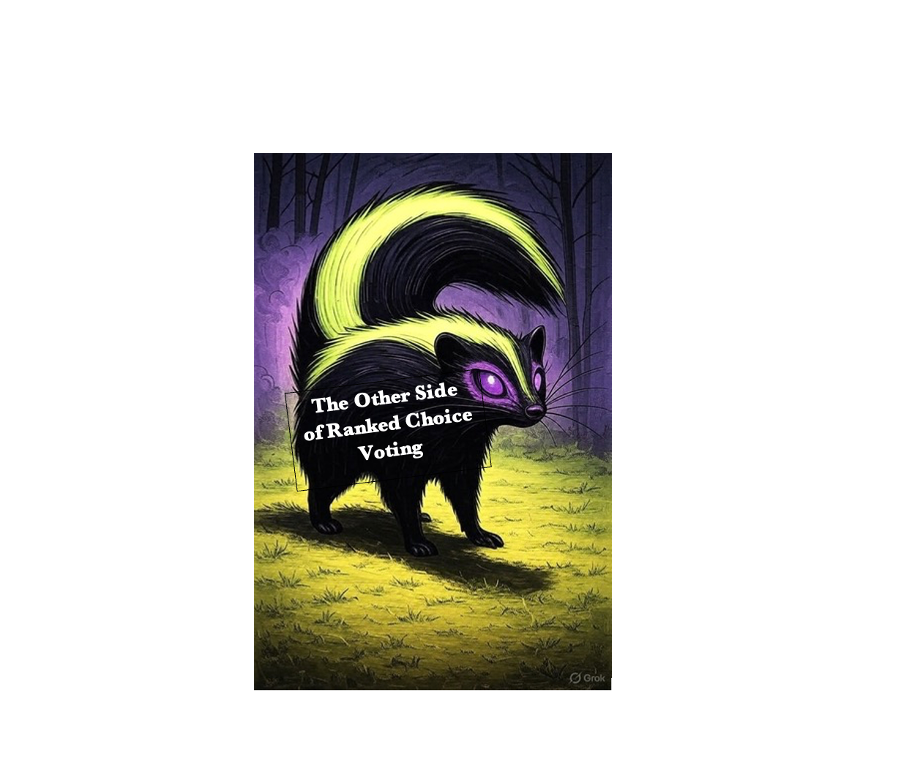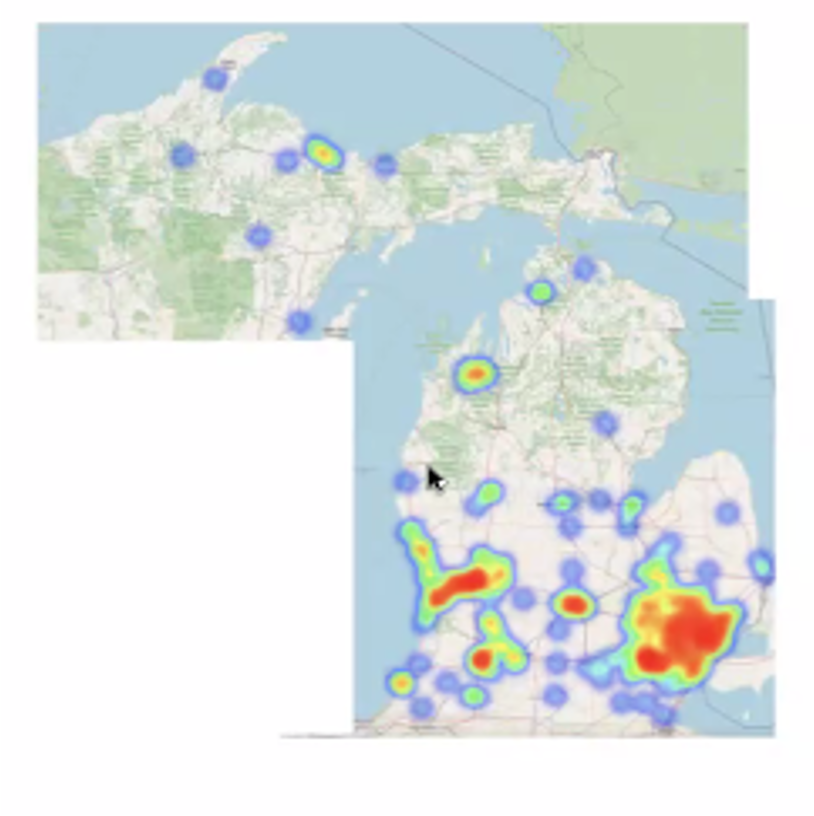The Other Side of Ranked Choice Voting in Michigan: Let's Hear the Full Story
- Pure Integrity Michigan Elections
- Aug 13, 2025
- 6 min read
Updated: Oct 7, 2025

By Patrice Johnson, Chair, Pure Integrity Michigan Elections
Okay, FairVote, you've had your say. In your August 7, 2025, article, you painted ranked choice voting (RCV) as a magical fix for Michigan's local elections—consolidating primaries and general elections into one efficient, high-turnout event that boosts voter choice, saves money, and delivers "the most representative outcome." You highlighted low primary turnout in cities like Detroit (17%), Dearborn Heights, and Lansing, and urged more cities to follow the lead of Ann Arbor, Ferndale, East Lansing, Kalamazoo, and Royal Oak, which have already voted for RCV but are stalled by state hurdles. And you plugged Rank MI Vote's 2026 ballot initiative as the key to unlocking it all.
But now, will you let us tell the other side of the story? As election clerks, researchers, and legal experts across Michigan and beyond have pointed out, RCV isn't the "simple upgrade" proponents claim. It's a complex, risky experiment that could disenfranchise voters, inflate costs, erode trust, and fail to deliver true majorities.
Drawing from real-world data, academic studies, and on-the-ground experiences—including Michigan's own failed RCV trial in Ann Arbor back in the 1970s—here's why rushing into RCV could do more harm than good.
Turnout Might Drop, Not Rise—Especially for Vulnerable Voters
You argue RCV would create "higher-turnout" elections by ditching low-participation primaries. But evidence shows the opposite: RCV often suppresses turnout, hitting minority and low-information voters hardest.
San Francisco State University's Jason McDaniel analyzed five mayoral elections in San Francisco (1995–2011) and found RCV decreased turnout by 18% among Black voters and 16% among white voters, with bigger gaps for older and less-educated groups.
A broader 2019 study of over 200 cities confirmed a 3–5 percentage point drop in RCV-adopting places.
Why? Ballot complexity.
Requiring voters to rank candidates leads to errors and confusion. A Cato Institute study of nearly two million San Francisco ballots found disqualifying errors were "significantly more common" under RCV.
University of Pennsylvania researchers Pettigrew and Radley, in a 2025 study, analyzed three million ballots and found 4.8% of RCV votes are rejected for improper marks—10 times higher than non-RCV races. San Francisco’s rejection rates, despite using RCV since 2004, exceed Alaska’s first-time use in 2022. Add "ballot exhaustion" (votes discarded when voters don’t rank enough candidates), and up to 25% of ballots may have no impact, per a Heritage Foundation analysis.
In Michigan, where voter suppression is a concern, this could hit elderly, limited-English, and overseas absentee voters hardest. Vulnerable groups are disproportionately affected and often have their votes invalidated due to uncorrectable errors. Ann Arbor’s 1975 RCV trial ended in repeal by 62% of voters in 1976, and a June 2025 Glengariff survey found 65% of Michiganders oppose RCV.

More Choice? Try More Discarded Votes and Fake Majorities
FairVote claims RCV gives "more voice" and ensures majority winners. But a Cornell University meta-analysis of 182 U.S. RCV elections (2004–2022) found 95 had "majoritarian failure"—winners with less than 50% of initial votes. In New York’s 2021 mayoral primary, with 10 candidates and six rounds, exhaustion rates soared (NYC Board of Elections). Professors Burnett and Kogan, in a 2023 study, reviewed 600,000 votes in California and Washington and found all four RCV winners had under 50%.
Watch PIME video:
RCV can also polarize. A University of Illinois study concluded RCV "exacerbates platform polarization" in partisan or low-engagement settings, producing extreme winners. Harvard’s Peter Buisseret and Columbia’s Carlo Prato, in a 2022 study, found RCV worsens polarization with strong partisan ties. RCV also eliminates traditional runoffs, which act as a "referendum" for voters to reassess candidates, as noted by Hans von Spakovsky in a Heritage Foundation report.
Legal experts argue RCV’s vote redistribution violates "one person, one vote" principles from cases like Reynolds v. Sims (1964), as vote redistribution can dilute equal weight. Congress could even ban RCV federally under the Elections Clause, as outlined in a 2025 legal analysis, citing risks to transparency and integrity.

Cheaper? Think Again—Costs Skyrocket for Clerks and Taxpayers\
You call RCV "faster" and "cheaper" by eliminating primaries. But clerks beg to differ. Joe Tirio, McHenry County Clerk (IL) warned of dramatic administrative complexity in his Ranked-choice voting is a solution in search of a problem.
“Election authorities would need new equipment, software, and extensive staff training. The counting process becomes exponentially more complex, delaying results and creating opportunities for confusion or error. In an era when public trust in elections is already strained, why would we voluntarily adopt a system that makes the process less transparent to the average citizen?”
Concrete data backs these cost concerns. An MIT study of seven RCV-adopting cities (2004–2011) found election costs rose by over five standard deviations compared to non-RCV peers—no savings. In Maine, a 2020 Southern Political Science Association survey found 90% of clerks favored RCV repeal due to doubled budgets and burdens. A Colorado clerk estimated $2.4–3 million upfront for a state half Michigan’s size, plus $350,000–400,000 annually (Maine Wire). Without state funding, locals foot the bill.
And audits? Near impossible. A 2024 Cambridge Journal study by MIT researchers found RCV’s instant-runoff system enables vote-buying and undermines the secret ballot. Manual recounts are "labor-intensive nightmares," per clerks, and delayed results (sometimes weeks) fuel distrust.
Michigan's Reality: Bans, Repeals, and Growing Opposition
Five cities support RCV, but Michigan law blocks implementation, and opposition grows. Seventeen states banned RCV since 2022, including Florida (Fla. Stat. § 101.019), Tennessee (Tenn. Code Ann. § 2-8-101), Idaho (Idaho Code § 34-903B), and South Dakota (S.D. Codified Laws § 12-13-28). Michigan GOP legislation (House Bill 4707) aims to prohibit it.
Rank MI Vote needs 446,198 signatures by early 2026, but a Glengariff poll shows 65% opposition. A University of Chicago study notes voters see traditional runoffs as "more legitimate."
Historically, RCV failed: Adopted in 24 U.S. cities by the 1940s, repealed in all but one by 1962. London reverted to first-past-the-post in 2022 (LSE report).
As Clerk Tirio wrote in his July 31, 2025 article, RCV “misses a fundamental point: no voter has ever approached me requesting the ability to vote for their second or third favorite candidate. In my years of service, citizens have consistently demonstrated they understand the current system and can navigate it effectively to express their political preferences.”

Time to Reject the Hype
Let's stick with what works and improve it thoughtfully. RCV is a bad idea. Our democratic republic depends on citizens having their voices heard and their votes counted. One person. One vote.
FairVote, your vision may sound appealing, but evidence from Harvard, MIT, Cornell, and Michigan clerks tells a different tale. RCV disenfranchises, confuses, costs more, and divides. Michiganders deserve transparent, accessible elections that build trust, not experiments that could discard votes and strain budgets. Stick with what works—improve it thoughtfully.

Coming soon: Michigan Fair Elections Institute's Ranked Choice Voting: A Threat to Our Electoral Process by Frederick Woodward.
AI was used in the creation of this article.
Learn how We The People can win back and secure OUR Future.

Join us Thursday, Aug. 14 at 12 PM for
the weekly Coalition Task Force Meeting
To attend this meeting, use the Registration link below . It changes weekly.
After registering, you will receive an email with details on how to join the meeting.
Important Notes and Disclaimers for Election Integrity Network National Working Groups and coalition calls
We operate under strict 501 (c)(4) non-profit, non-partisan guidelines. Please do not make any comments during the call or in the chat that are directly related to any campaign or candidate running for office or could be considered an endorsement or opposition of that candidate.
We always welcome new participants but ask that all newcomers register with their own registration link. Please do not forward your personal link to another participant.
For the security of the call, if you join by phone, you may be asked to unmute and provide your name.
This meeting is for educational purposes only and should not be construed as legal advice or instruction to lobby on behalf of any issue or organization.
Mark your calendars to attend Election Integrity Network's outstanding National Working Groups. Consider also serving as liaison to report to the Task Force Coalition on our Thursday News@Noon meetings.
A link to the full list of National Working Group Meetings is HERE (All meetings are noted in Eastern time.)
The views and opinions expressed in this commentary are those of the author and do not reflect the official position of Pure Integrity Michigan Elections. Every article written by a PIME author or guest author is generated by the author or editor alone. However, links or images embedded within the article, may have been generated by artificial intelligence.



Comments